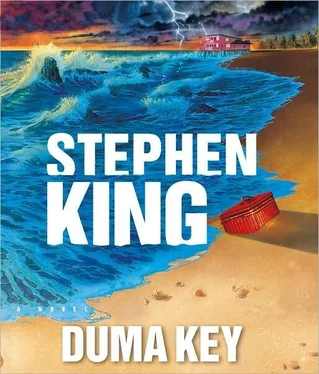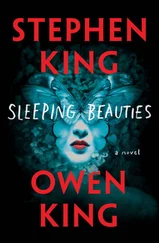“Was it a momentary thing where you felt like chopping off his dick, then putting out his eyes with a hot toasting-fork? Was it that momentary thing, muchacho ?” Wireman made the thumb and forefinger of one hand into a gun and pointed it at me. “I was married to a Mexican lassie, and I know jealousy. It’s normal. Like a startle-reflex.”
“Did your wife ever…” I stopped, suddenly aware all over again that I’d only met this man the day before. That was easy to forget. Wireman was intense .
“No, amigo, not to my knowledge. What she did was die on me.” His face was perfectly expressionless. “Let’s not go there, okay?”
“Okay.”
“Thing to remember about jealousy is it comes, it goes. Like the afternoon showers down here during the mean season. You’re over it, you say. You should be, because you ain’t her campesino no more. The question is what you’re going to do about this other thing. How you going to keep this guy from killing himself? Because you know what happens when the happy-family cruise is over, right?”
For a moment I said nothing. I was translating that last bit of Spanish, or trying to. You ain’t her farmer no more, was that right? If so, it had a bitter ring of truth.
“ Muchacho? Your next move?”
“I don’t know,” I said. “He’s got e-mail, but what do I write to him? ‘Dear Tom, I’m worried you’re contemplating suicide, please reply soonest’? I bet he’s not checking his e-mail while he’s on vacation, anyway. He’s got two ex-wives, and still pays alimony to one of them, but he’s not close to either. There was one kid, but he died in infancy — spina bifida, I think — and… what? What? ”
Wireman had turned away and sat slouched in his chair, looking out at the water, where pelicans were diving for their own high tea. His body English suggested disgust.
He turned back. “Quit squirming. You know damn well who knows him. Or you think you do.”
“Pam? You mean Pam ?”
He only looked at me.
“Are you going to talk, Wireman, or only sit there?”
“I have to check on my lady. She’ll be up by now and she’s going to want her four o’clockies.”
“Pam would think I’m crazy! Hell, she still thinks I’m crazy!”
“Convince her.” Then he relented a little. “Look, Edgar. If she’s been as close to him as you think, she’ll have seen the signs. And all you can do is try. Entiendes? ”
“I don’t understand what that means.”
“It means call your wife.”
“She’s my ex.”
“Nope. Until your mind changes, the divorce is just a legal fiction. That’s why you give a shit what she thinks about your state of mind. But if you also care about this guy, you’ll call her and tell her you have reason to think he’s planning to highside it.”
He heaved himself out of his chair, then held out his hand. “Enough palaver. Come on and meet the boss. You won’t be sorry. As bosses go, she’s a pretty nice one.”
I took his hand and let him pull me out of what I presumed was a replacement beach chair. He had a strong grip. That was something else I’ll never forget about Jerome Wireman; the man had a strong grip. The boardwalk up to the gate in the back wall was only wide enough for one, so I followed, limping gamely along. When he reached the gate — which was a smaller version of the one in front and looked as Spanish as Wireman’s offhand patois — he turned toward me, smiling a little.
“Josie comes in to clean Tuesdays and Thursdays, and she’s willing to keep an ear out for Miss Eastlake during her afternoon nap — which means I could come down and look at your pictures tomorrow afternoon around two, if that suits.”
“How did you know I wanted you to? I was still working up the nerve to ask.”
He shrugged. “It’s pretty obvious you want someone to look before you show them to the guy at that gallery. Besides your daughter and the kid who runs your errands, that is.”
“The appointment’s on Friday. I’m dreading it.”
Wireman waggled his hand in the air and smiled. “Don’t worry,” he said. He paused. “If I think your stuff is crap, I’m going to tell you so.”
“That works.”
He nodded. “Just wanted to be clear.” Then he opened the gate and led me into the courtyard of Heron’s Roost, also known as Palacio de Asesinos .
I’d already seen the courtyard, on the day I’d used the front entrance to turn around, but on that day I’d gotten little more than a glance. I’d mostly been concentrating on getting myself and my ashen-faced, perspiring daughter back to Big Pink. I’d noticed the tennis court and the cool blue tiles, but had missed the koi pool entirely. The tennis court was swept and ready for action, its paved surface two shades darker than the courtyard tile. One turn of the chrome crank would bring the net taut and ready. A full basket of balls stood on wire stilts, and made me think briefly of the sketch Ilse had taken back to Providence with her: The End of the Game .
“One of these days, muchacho, ” Wireman said, pointing at the court as we walked by. He had slowed down so I could catch up. “You and me. I’ll take it easy on you — just volley-and-serve — but I hunger to swing a racket.”
“Is volley-and-serve what you charge for evaluating pictures?”
He smiled. “I have a price, but that ain’t it. Tell you later. Come on in.”
Wireman led me through the back door, across a dim kitchen with large white service islands and an enormous Westinghouse stove, then into the whispering interior of the house, which shone with dark woods — oak, walnut, teak, redwood, cypress. This was a Palacio, all right, old Florida style. We passed one book-lined room with an actual suit of armor brooding in the corner. The library connected with a study where paintings — not stodgy oil portraits but bright abstract things, even a couple of op-art eye-poppers — hung on the walls.
Light showered down on us like white rain as we walked the main hall ( Wireman walked; I limped), and I realized that, for all of the mansion’s grandeur, this part of it was no more than a glorified dogtrot — the kind that separates sections of older and much humbler Florida dwellings. That style, almost always constructed of wood (sometimes scrapwood) rather than stone, even has a name: Florida Cracker.
This dogtrot, filled with light courtesy of its long glass ceiling, was lined with planters. At its far end, Wireman hung a right. I followed him into an enormous cool parlor. A row of windows gave on a side courtyard filled with flowers — my daughters could have named half of them, Pam all of them, but I could only name the asters, dayflowers, elderberry, and foxglove. Oh, and the rhododendron. There was plenty of that. Beyond the tangle, on a blue-tiled walk that presumably connected with the main courtyard, stalked a sharp-eyed heron. It looked both thoughtful and grim, but I never saw a one on the ground that didn’t look like a Puritan elder considering which witch to burn next.
In the center of the room was the woman Ilse and I had seen on the day we tried exploring Duma Key Road. Then she’d been in a wheelchair, her feet clad in blue Hi-Tops. Today she was standing with her hands planted on the grips of a walker, and her feet — large and very pale — were bare. She was dressed in a high-waisted pair of beige slacks and a dark brown silk blouse with amusingly wide shoulders and full sleeves. It was an outfit that made me think of Katharine Hepburn in those old movies they sometimes show on Turner Classic Movies: Adam’s Rib, or Woman of the Year . Only I couldn’t remember Katharine Hepburn looking this old, even when she was old.
Читать дальше










